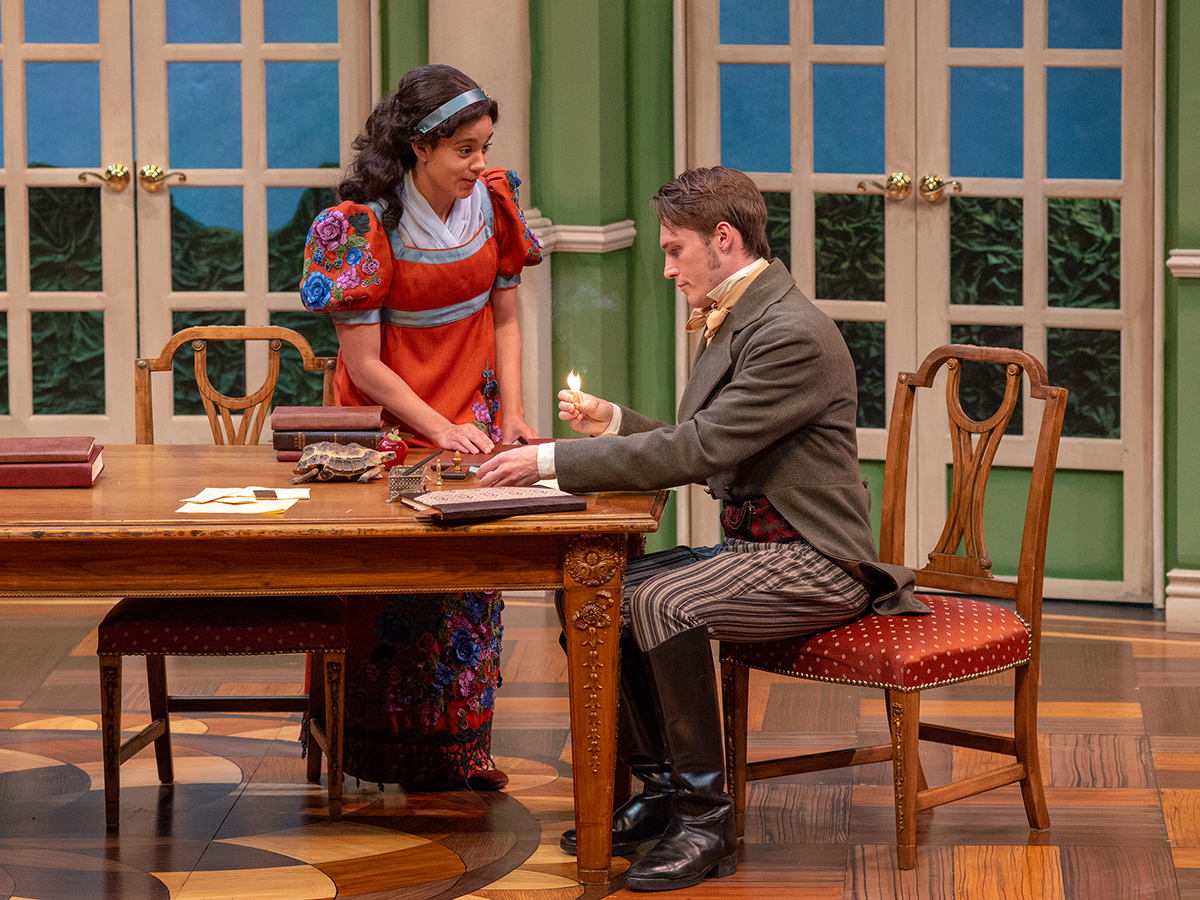Review: ARCADIA at Solvang Festival Theater
 Cleverly plotted, delightfully comic, and incessantly thought-provoking, Tom Stoppard's Arcadia, produced by PCPA, is showing now until September 9th in Solvang. The action takes place in a room of the Coverly estate in two different eras: the early 19th century and the present. The plots of the two periods interweave like the interlacing mahogany marquetry that covers the floor of the stately set. The production keeps the audience wondering how these two distinct worlds on their own linear trajectories of time will join together. When they do, they bend time and action into a twirling circle of recurrence.
Cleverly plotted, delightfully comic, and incessantly thought-provoking, Tom Stoppard's Arcadia, produced by PCPA, is showing now until September 9th in Solvang. The action takes place in a room of the Coverly estate in two different eras: the early 19th century and the present. The plots of the two periods interweave like the interlacing mahogany marquetry that covers the floor of the stately set. The production keeps the audience wondering how these two distinct worlds on their own linear trajectories of time will join together. When they do, they bend time and action into a twirling circle of recurrence.
In the broad strokes of the story, we find young Thomasina Coverly (Grace Theobald) at the age of 13 and, later, nearly 17. She is taking instruction from her tutor, Septimus Hodge (Luke Myers), a young scientist with a passion for geometry and for the lady of the house, Lady Croom (Polly Firestone Walker). Thomasina, it soon becomes clear, is a genius. She solves Fermat's Last Theorem in the space of a few hours. Certain subjects, however, like the notion of "carnal embrace," elude her. Her general curiosity prompts her to prod the conspicuous mysteries of the world that the grown-ups around her no longer notice. For example, she asks Septimus why her pudding cannot be "unstirred": "When you stir your rice pudding, Septimus, the spoonful of jam spreads itself round making red trails... But if you stir backward, the jam will not come together again." Given no satisfactory answer, Thomasina sticks to her questioning until she has a method to understand these problems.
The play explores the tension between determinism and free will; rationalism and emotion; the scientific revolution and romanticism; and Newtonian physics and chaos theory. Septimus' pet tortoise, named "Plautus" in the 19th century and "Lightning" in the present, is played by a real, live tortoise in this production. For the most part, he sits still on the table, center stage. When I saw the production, he took a little stroll down the table toward Thomasina. I found his movements riveting because I did not know what he would do next. He stirs an element of chance into the rice pudding of the plot. The play uses the tortoise as a breathing symbol of the passage of time and of random chance, meandering through the pre-determined contours of the play space, and connecting the two eras.
In the present-day action of the play, writer Hannah Jarvis (Amani Dorn) discovers that Thomasina was, indeed, a genius--a person who opens a door to a house that has not yet been built, as the character Valentine (Wallace Bruce) puts it. Hannah wants to know more about Thomasina and about the hermit who lived on the grounds of the estate in the early 19th century. The hermit will serve in her book as a symbol of romanticism or "the decline from thinking to feeling."
Hannah's coolly rational mode of inquiry clashes with the heatedly grandiose personality and methods of Byron scholar, Bernard Nightingale (George Walker). Bernard claims that Lord Byron killed an obscure poet named Ezra Chater (Ben Abbott) in a duel during a visit to the Coverly estate. It's a mark of the success of this production that Bernard manages to be utterly boorish and thoroughly charming at the same time. At the height of his tactlessness, he gives an elegiac defense of the arts against the self-assured supremacy of science. George Walker's impassioned delivery of Bernard's monologue at the top of the second act is worth the night's ticket.
Other productions of this play might neglect its gravitational pull toward emotion, but director Roger DeLaurier allows the poignancy of the love story to build quietly to its climax as he balances it with the play's thought-provoking debates.
Videos
